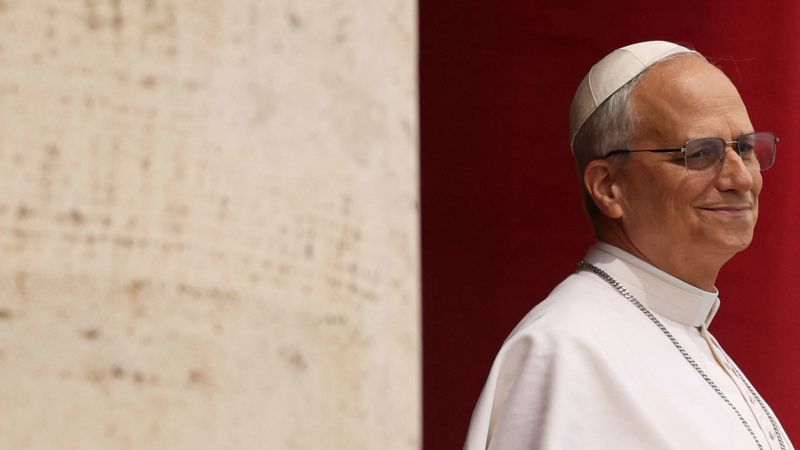Examining Pope Leo XIII's Leadership: A Reformer's Approach To The Catholic Church

Welcome to your ultimate source for breaking news, trending updates, and in-depth stories from around the world. Whether it's politics, technology, entertainment, sports, or lifestyle, we bring you real-time updates that keep you informed and ahead of the curve.
Our team works tirelessly to ensure you never miss a moment. From the latest developments in global events to the most talked-about topics on social media, our news platform is designed to deliver accurate and timely information, all in one place.
Stay in the know and join thousands of readers who trust us for reliable, up-to-date content. Explore our expertly curated articles and dive deeper into the stories that matter to you. Visit Best Website now and be part of the conversation. Don't miss out on the headlines that shape our world!
Table of Contents
Examining Pope Leo XIII's Leadership: A Reformer's Approach to the Catholic Church
Pope Leo XIII (1878-1903) stands as a pivotal figure in modern Catholic history, remembered not only for his lengthy papacy but also for his significant impact on the Church's trajectory in the face of rapid societal changes. His leadership, characterized by a pragmatic and reformist approach, navigated the complexities of the late 19th century, leaving an enduring legacy that continues to be debated and analyzed today. This article delves into key aspects of his pontificate, exploring his responses to industrialization, modernism, and the burgeoning social questions of his era.
Responding to the Industrial Revolution: Rerum Novarum and Social Justice
One of Leo XIII's most enduring contributions is his encyclical Rerum Novarum (1891), a landmark document addressing the social and economic challenges posed by the Industrial Revolution. This groundbreaking text, often hailed as the foundational document of Catholic social teaching, condemned both laissez-faire capitalism and socialism, advocating instead for a more just and humane economic system. Rerum Novarum championed the rights of workers, emphasizing the dignity of labor and the importance of fair wages, reasonable working hours, and the right to form unions. This proactive engagement with pressing social issues marked a significant departure from previous papal approaches and set the stage for the Church's continued involvement in social justice initiatives.
Navigating Modernism and the Rise of Secularism
The late 19th century also witnessed the rise of modernism, a philosophical and intellectual movement challenging traditional religious beliefs. Leo XIII, while wary of modernist tendencies that he perceived as undermining Catholic dogma, recognized the need for the Church to engage with contemporary intellectual currents. His approach was characterized by a careful balance between upholding traditional doctrines and adapting the Church's message to a changing world. He established the Pontifical Biblical Commission to promote rigorous scholarship within the context of faith, a move that aimed to address critical scholarship while safeguarding orthodox interpretations.
Expanding Catholic Education and Missions
Pope Leo XIII also prioritized the expansion of Catholic education and missionary work. He saw education as crucial for both individual growth and the strengthening of the Church's presence in society. His support for Catholic schools and universities aimed to provide a comprehensive education grounded in faith and reason. Simultaneously, he actively encouraged missionary efforts worldwide, seeking to spread the Gospel message to new audiences. This commitment to evangelization and education continues to inform the Church's global mission today.
A Legacy of Pragmatism and Reform
Leo XIII's papacy was marked by a pragmatic and reformist spirit. While firmly rooted in tradition, he demonstrated a willingness to adapt the Church's approach to address the challenges of a rapidly changing world. His engagement with social issues, his cautious response to modernism, and his commitment to education and missions have left a lasting impact on the Catholic Church. His legacy remains a subject of ongoing discussion and analysis, with scholars continually exploring the complexities of his leadership and its long-term consequences.
Further Reading:
Call to Action: What are your thoughts on Pope Leo XIII's legacy? Share your perspectives in the comments below!

Thank you for visiting our website, your trusted source for the latest updates and in-depth coverage on Examining Pope Leo XIII's Leadership: A Reformer's Approach To The Catholic Church. We're committed to keeping you informed with timely and accurate information to meet your curiosity and needs.
If you have any questions, suggestions, or feedback, we'd love to hear from you. Your insights are valuable to us and help us improve to serve you better. Feel free to reach out through our contact page.
Don't forget to bookmark our website and check back regularly for the latest headlines and trending topics. See you next time, and thank you for being part of our growing community!
Featured Posts
-
 Spoan Disease Investigating The Impact Of Consanguineous Marriages In Brazil
May 13, 2025
Spoan Disease Investigating The Impact Of Consanguineous Marriages In Brazil
May 13, 2025 -
 Bellingers 2025 Dip Potential Implications For His Future Contract
May 13, 2025
Bellingers 2025 Dip Potential Implications For His Future Contract
May 13, 2025 -
 Katherine Schwarzeneggers First Mothers Day Chris Pratts Sweet Message
May 13, 2025
Katherine Schwarzeneggers First Mothers Day Chris Pratts Sweet Message
May 13, 2025 -
 Polands Tusk Directly Implicates Russia In Devastating Warsaw Fire
May 13, 2025
Polands Tusk Directly Implicates Russia In Devastating Warsaw Fire
May 13, 2025 -
 Following Strong Weekend Yankees Rising Star Missing From Mondays Game
May 13, 2025
Following Strong Weekend Yankees Rising Star Missing From Mondays Game
May 13, 2025
Latest Posts
-
 Water Restrictions Force Ban On Tanker Deliveries To Us Billionaires Estate
Sep 13, 2025
Water Restrictions Force Ban On Tanker Deliveries To Us Billionaires Estate
Sep 13, 2025 -
 Star Trek Strange New Worlds Season 3 Finale Showrunner Interview Breakdown
Sep 13, 2025
Star Trek Strange New Worlds Season 3 Finale Showrunner Interview Breakdown
Sep 13, 2025 -
 Where Does Randy Orton Go After Wwe Retirement Exploring His Next Chapter
Sep 13, 2025
Where Does Randy Orton Go After Wwe Retirement Exploring His Next Chapter
Sep 13, 2025 -
 The End Of Restrictions How Wnba Players Won Style Autonomy
Sep 13, 2025
The End Of Restrictions How Wnba Players Won Style Autonomy
Sep 13, 2025 -
 Simple Solutions For Fussy Eaters Expert Guidance For Peaceful Meals
Sep 13, 2025
Simple Solutions For Fussy Eaters Expert Guidance For Peaceful Meals
Sep 13, 2025
